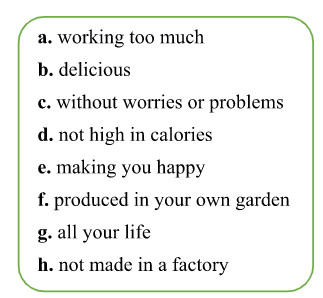Tiếng Anh 10 Unit 10 10CA. Read the news report. In 2018, which country was the happiest in the world? B. Look at the compound adjectives above in blue. Compound adjectives have two words joined together. What are the two words in each compound adjective? C. Match the compound adjectives to their meanings in the box. D. Complete the sentences. Use adjectives from C. E. Choose three compound adjectives in C and write sentences with the adjectives about your lifestyle. F. Complete the sentences. G. Make Yes / No question
Lựa chọn câu để xem lời giải nhanh hơn
A Language Expansion: Compound Adjectives (Mở rộng ngôn ngữ: Tính từ Ghép) A. Read the news report. In 2018, which country was the happiest in the world? (Đọc báo cáo sau. Năm 2018, quốc gia nào hạnh phúc nhất thế giới?)
Lời giải chi tiết: - In 2018, Finland was the happiest in the world. (Năm 2018, Phần Lan là quốc gia hạnh phúc nhất thế giới.) B B. Look at the compound adjectives above in blue. Compound adjectives have two words joined together. What are the two words in each compound adjective? (Nhìn vào các tính từ ghép ở trên có màu xanh dương. Tính từ ghép có hai từ nối với nhau. Hai từ trong mỗi tính từ ghép đó là gì?) Lời giải chi tiết: - stress (n): căng thẳng - free (adj): rảnh, miễn phí - over (prep): quá - work (v): làm việc C Vocabulary (Từ vựng) C. Match the compound adjectives to their meanings in the box. (Nối các tính từ ghép với nghĩa của chúng trong bảng.)
 Phương pháp giải: - mouthwatering: hấp dẫn, kích thích vị giác - homemade: tự làm ở nhà - heartwarming: ấm lòng - lifelong: suốt đời - stress-free: không căng thẳng - homegrown: cây nhà lá vườn - overworked: làm việc quá sức - low-calorie: lượng calo thấp Lời giải chi tiết:
1 – b: mouthwatering = delicious (hấp dẫn, kích thích vị giác = ngon) 2 – h: homemade = not made in a factory (tự làm ở nhà = không làm ở nhà máy) 3 – e: heartwarming = making you happy (ấm lòng = khiến bạn vui) 4 – g: lifelong = all your life (suốt đời = cả đời) 5 – c: stress-free = without worries or problems (không căng thẳng = không có lo lắng hay vấn đề) 6 – f: homegrown = produced in your own garden (cây nhà lá vườn = sản xuất ở trong vườn nhà) 7 – a: overworked = working too much (làm việc quá sức = làm việc quá nhiều) 8 – d: low-calorie = not high in calories (lượng calo thấp = mức độ calo không cao) D D. Complete the sentences. Use adjectives from C. (Hoàn thành các câu. Sử dụng các tính từ trong bài C.) 1. Kevin and I went to kindergarten together. We are _____ friends. 2. When I was a child, my father had a vegetable garden. We ate lots of _____ fruit and vegetables. 3. I have to work long hours, and I'm always tired. I think I am _____. 4. My grandmother makes the best _____ chicken soup in the world! It's absolutely _____. Lời giải chi tiết:
1. Kevin and I went to kindergarten together. We are lifelong friends. (Kevin và tôi đã đi học mẫu giáo cùng nhau. Chúng tôi là bạn suốt đời.) 2. When I was a child, my father had a vegetable garden. We ate lots of homegrown fruit and vegetables. (Khi tôi còn nhỏ, cha tôi có một vườn rau. Chúng tôi đã ăn rất nhiều trái cây và rau quả nhà trồng.) 3. I have to work long hours, and I'm always tired. I think I am overworked. (Tôi phải làm việc nhiều giờ, và tôi luôn mệt mỏi. Tôi nghĩ rằng tôi đang làm việc quá sức.) 4. My grandmother makes the best homemade chicken soup in the world! It's absolutely mouthwatering. (Bà tôi làm món súp gà tự làm ngon nhất trên thế giới! Nó cực kỳ hấp dẫn.) E E. MY WORLD (Thế giới của tôi) Choose three compound adjectives in C and write sentences with the adjectives about your lifestyle. (Chọn ba tính từ ghép trong bài C và đặt câu với các tính từ về lối sống của bạn.) Lời giải chi tiết: - I’m eating low-calorie food to lose weight. (Tôi đang ăn thức ăn ít calo để giảm cân.) - I want to live a stress-free life in the future. (Tôi muốn sống một cuộc sống không căng thẳng trong tương lai.) - There is less homegrown food in the supermarket. (Có ít thực phẩm nhà trồng trong siêu thị.) F Grammar (See Grammar Reference pp. 158-159) (Ngữ pháp (Xem Tài liệu Ngữ pháp trang 158-159)) F. Complete the sentences. (Hoàn thành các câu sau.)
Phương pháp giải: - Cấu trúc câu tường thuật câu hỏi Yes / No: S + asked + if / whether + S + V (lùi thì) - Cấu trúc câu tường thuật câu hỏi có từ để hỏi: S + asked + từ để hỏi + S + V (lùi thì) Lời giải chi tiết: 1. Mike said to me, “Where do you come from?” (Mike nói với tôi, “Bạn đến từ đâu?”) → Mike asked me where I came from. (Mike hỏi tôi là tôi từ đâu đến.) Giải thích: lùi thì: hiện tại đơn => quá khứ đơn, đổi đại từ nhân xưng “you” => “I” 2. “How many hours do you work a week?” he asked me. (“Bạn làm việc bao nhiêu giờ một tuần?” anh ấy hỏi tôi.) → He asked me how many hours I worked a week. (Anh ấy đã hỏi tôi làm việc bao nhiêu giờ một tuần.) Giải thích: lùi thì: hiện tại đơn => quá khứ đơn, đổi đại từ nhân xưng “you” => “I” 3. “When does the train arrive?” he asked me. (“Khi nào thì tàu đến?” anh ấy hỏi tôi.) → He asked me when the train arrived. (Anh ấy hỏi tôi khi nào tàu đến.) Giải thích: câu tường thuật ở thì quá khứ đơn => câu trực tiếp ở thì hiện tại đơn, câu tường thuật dùng từ để hỏi “when” => câu trực tiếp là câu hỏi có từ để hỏi 4. She asked Long, “Do you spend time on social media?” (Cô ấy hỏi Long, “Bạn có dành thời gian trên mạng xã hội không?”) → She asked Long if / whether he spent time on social media. (Cô ấy hỏi Long rằng liệu anh ấy có dành thời gian trên mạng xã hội hay không.) Giải thích: lùi thì: hiện tại đơn => quá khứ đơn, đổi đại từ nhân xưng “you” => “he” 5. “Do you eat fresh vegetables?” she asked me. (“Bạn có ăn rau tươi không?” cô ấy hỏi tôi.) → She asked me if I ate fresh vegetables. (Cô ấy hỏi tôi liệu tôi có ăn rau tươi không.) Giải thích: câu tường thuật ở thì quá khứ đơn => câu trực tiếp ở thì hiện tại đơn, câu tường thuật dùng “if” => câu trực tiếp là câu hỏi Yes / No G G. Make Yes / No questions and Wh- questions about your lifestyles. In pairs, turn the questions into reported speech. (Đặt câu hỏi “Yes / No” và câu hỏi có từ để hỏi “Wh-“ về lối sống của bạn. Hoạt động theo cặp, chuyển các câu hỏi thành câu tường thuật.) Phương pháp giải: - Cấu trúc câu tường thuật câu hỏi Yes / No: S + asked + if / whether + S + V (lùi thì) - Cấu trúc câu tường thuật câu hỏi có từ để hỏi: S + asked + từ để hỏi + S + V (lùi thì) Lời giải chi tiết: - “Do you drink enough water?” Hoa said to Linh. (“Bạn có uống đủ nước không?” Hoa nói với Linh.) → Hoa asked Linh if she drank enough water. (Hoa hỏi Linh liệu cô ấy có uống đủ nước không.) Giải thích: lùi thì: hiện tại đơn => quá khứ đơn, đổi đại từ nhân xưng “you” => “she” - “How often do you work out at the gym?” Hoa asked Linh. (“Bạn thường tập luyện ở phòng tập thể dục như thế nào?” Hoa hỏi Linh.) → Hoa asked Linh how often she worked out at the gym. (Hoa hỏi Linh xem cô ấy thường tập luyện ở phòng tập thể dục như thế nào.) Giải thích: lùi thì: hiện tại đơn => quá khứ đơn, đổi đại từ nhân xưng “you” => “she” H Conversation (Optional) (Hội thoại (Tự chọn)) H. Listen to the conversation. Did Greg have a healthy lifestyle? What about Troy? (Nghe đoạn hội thoại. Greg đã có lối sống lành mạnh phải không? Còn Troy thì sao?) Troy: Hi, Greg. Rosie asked if we would like to join her graduation party this Saturday. Greg: I’d love to, but I can’t. My grandpa needs a hand for his garden this weekend. Troy: Oh, you know, she also asked me if we could help decorate for her party on Friday. Greg: OK, I will come to give her a hand after exercising, Troy: How often do you exercise? Greg: I work out at the gym almost every weekday and ride my bike to my grandparents’ house about twice a week. Troy: That's why you're always in good shape. How many hours a week do you work out? Greg: Around 10 hours. You should get more exercise, too, Troy. Troy: Oh, I love football. I usually stay up until 3 in the morning to watch my favorite team. My mom often asks me why I didn’t try out for the football team. It’s a great idea, but I’d rather watch it than play it. Phương pháp giải: Tạm dịch: Troy: Xin chào, Greg. Rosie hỏi liệu rằng chúng ta có muốn tham gia bữa tiệc tốt nghiệp của cô ấy vào thứ Bảy này không. Greg: Tôi rất thích, nhưng tôi không thể. Ông của tôi cần người giúp ông làm vườn vào cuối tuần này. Troy: Ồ, bạn biết đấy, cô ấy cũng hỏi tôi liệu chúng ta có thể giúp trang trí cho bữa tiệc của cô ấy vào thứ Sáu không. Greg: Được, tôi sẽ đến giúp cô ấy một tay sau khi tập thể dục. Troy: Bạn tập thể dục thường xuyên như thế nào? Greg: Tôi tập thể dục tại phòng tập hầu như tất cả các ngày trong tuần và đạp xe đến nhà ông bà khoảng hai lần một tuần. Troy: Đó là lý do tại sao bạn luôn có vóc dáng khoẻ mạnh. Bạn tập bao nhiêu tiếng một tuần? Greg: Khoảng 10 tiếng. Cậu cũng nên tập thể dục nhiều hơn, Troy. Troy: Ồ, tôi yêu bóng đá. Tôi thường thức đến 3 giờ sáng để theo dõi đội bóng yêu thích của mình. Mẹ tôi thường hỏi tôi tại sao tôi không thử chơi cho đội bóng đá. Đó là một ý tưởng tuyệt vời, nhưng tôi muốn xem nó hơn là chơi nó. Lời giải chi tiết: - Yes, he did. (Đúng vậy.) - Troy doesn’t have a healthy lifestyle. (Troy không có lối sống lành mạnh.) Goal check GOAL CHECK – Talk about Lifestyles (Kiểm tra mục tiêu – Nói về Phong cách sống) 1. Write three questions to ask your classmates about their lifestyles. (Viết ba câu hỏi để hỏi bạn cùng lớp của bạn về phong cách sống của họ.) 2. Interview classmates with your questions. (Phỏng vấn các bạn cùng lớp với câu hỏi của bạn.) 3. In small groups, practice turning the questions the groups made into reported speech. (Hoạt động theo các nhóm nhỏ, luyện tập chuyển các câu hỏi các nhóm đã đặt ra thành những câu tường thuật.) Lan: Nga, how much exercise do you get a week? Nga: Not much because of my study schedule. I go to the gym about once a month. Hoa: Lan asked Nga how much exercise she got a week. Phương pháp giải: Tạm dịch: Lan: Nga, bạn tập thể dục nhiều bao nhiêu một tuần? Nga: Không nhiều lắm vì tôi có lịch học. Tôi đi đến phòng tập khoảng một lần mỗi tháng. Hoa: Lan hỏi Hoa rằng cô ấy tập thể dục nhiều bao nhiêu một tuần. Lời giải chi tiết: Linh: Do you drink soft drinks? Mai: No, I don’t. San: Linh asked Mai if she drank soft drinks. Tạm dịch: Linh: Cậu có uống nước ngọt không? Mai: Không, tớ không. San: Linh hỏi Mai xem liệu cô ấy có uống nước ngọt không. Linh: How many hours do you watch TV every day? Mai: Half an hour. San: Linh asked Mai how many hours she watched TV every day. Tạm dịch: Linh: Cậu xem tivi bao nhiêu tiếng mỗi ngày? Mai: Nửa tiếng. San: Linh hỏi Mai rằng cô ấy xem ti vi bao nhiêu tiếng mỗi ngày. Linh: How much tea do you drink a day? Mai: I drink 2 cups. San: Linh asked Mai how much tea she drank a day. Tạm dịch: Linh: Cậu uống bao nhiêu trà một ngày? Mai: Tớ uống 2 cốc. San: Linh hỏi Mai cô ấy uống bao nhiêu trà một ngày.
>> Học trực tuyến Lớp 10 cùng thầy cô giáo giỏi tại Tuyensinh247.com, (Xem ngay) Cam kết giúp học sinh học tốt, bứt phá điểm 9,10 chỉ sau 3 tháng, làm quen kiến thức, định hướng luyện thi TN THPT, ĐGNL, ĐGTD ngay từ lớp 10
|





















